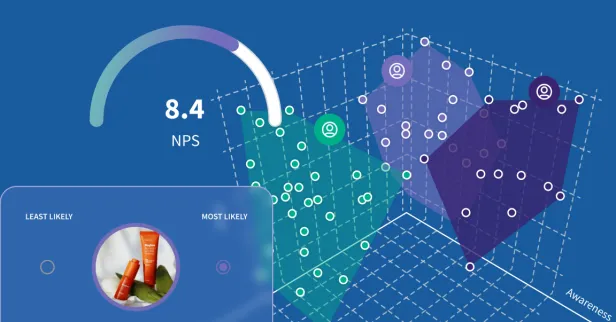In its traditional form, market research takes time. It takes time to build studies. It takes time to collect responses. And it takes time to thoroughly analyze the results.
But even though research is a driving force for intelligent decision-making, we don't always have time.
This challenge has given rise to an iterative approach.
For those unfamiliar with the term, iterative market research is a circular process. One that uses data from a study to inform the questions and goals of the next. This approach balances the need for speed and agility with the need for deep and relevant insights.
Instead of trying to run a single study packed tightly with objectives, you run multiple, smaller surveys. Each providing the insights that guide your next project.
When done right, iterative market research enables you to act on insights quickly and make more impactful decisions. But the key is moving fast; without sacrificing quality.
As iterative market research continues to gain popularity, we’re sharing some of our tips to help you get started.
1. Begin with the end in mind.
Much like any research study, you need to lay out your goals and objectives at the start.
Here it can be helpful to work backward, thinking about the insights you need and the story you want to tell.
Gather the stakeholders involved and ask yourself some questions like; how exactly will we use this data once we have it? What metrics matter most? And what decisions will be informed by our findings?
By laying out the goals for each study, it will be easier to write effective questions and design experiments that produce actionable insights.
2. Try flexible templates.
If you're looking for a way to reduce the build time for your surveys and experiments, templates can be a great option!
Not only will a good template make your workflow more efficient, but you may also discover some questions and techniques you hadn't previously considered.
But when looking for templates, you’ll want to keep an eye out for two factors: level of detail and flexibility.
It’s important to find a survey template that includes the questions and experiments you need while still having the flexibility to add, remove, re-order, and edit where necessary. Check out the links below for a few of our most popular templates:
Brand Awareness Survey Template
Messaging & Claims Testing Template
3. Lean on automation.
While templates can save you time on the front end, automation can do the heavy lifting on the back end.
Automated analysis functionalities allow you to ditch tedious manual tasks like data cleaning, organizing, exporting, and reporting. Not only does this cut down on your overall time-to-insights, but it also gives you time back for mission-critical objectives, like digging into your data and finding ways to use insights to better your organization.
4. Report on the insights that matter most.
In iterative market research, the key findings from each study are directly applied to the next round of experimentation. So when you look at your data, you'll need to distill your findings into key learnings. The simpler, the better.
Sure, it may be interesting that females under 30 were the most likely to prefer your indigo packaging concept. But is that insight really going to help inform your next study? Probably not.
Dig deep into your data, but keep focused on the metrics and outcomes that will have a direct impact.
Iterative Market Research with SightX
The SightX platform is the only tool you'll ever need for iterative market research: a single, unified solution for consumer engagement, data collection, advanced analysis, and reporting. While powerful enough for insights teams at Fortune 500 companies, the user-friendly interface makes it simple for anyone to start, optimize, and scale their research.
Plus, with SightX's research team, you can gain access to the best thinking in the insights field. Our in-house experts will guide you through every step in the market research process, from survey scripting to analysis support, and everything in-between.
If you're ready to get started with iterative market research, get started today!
